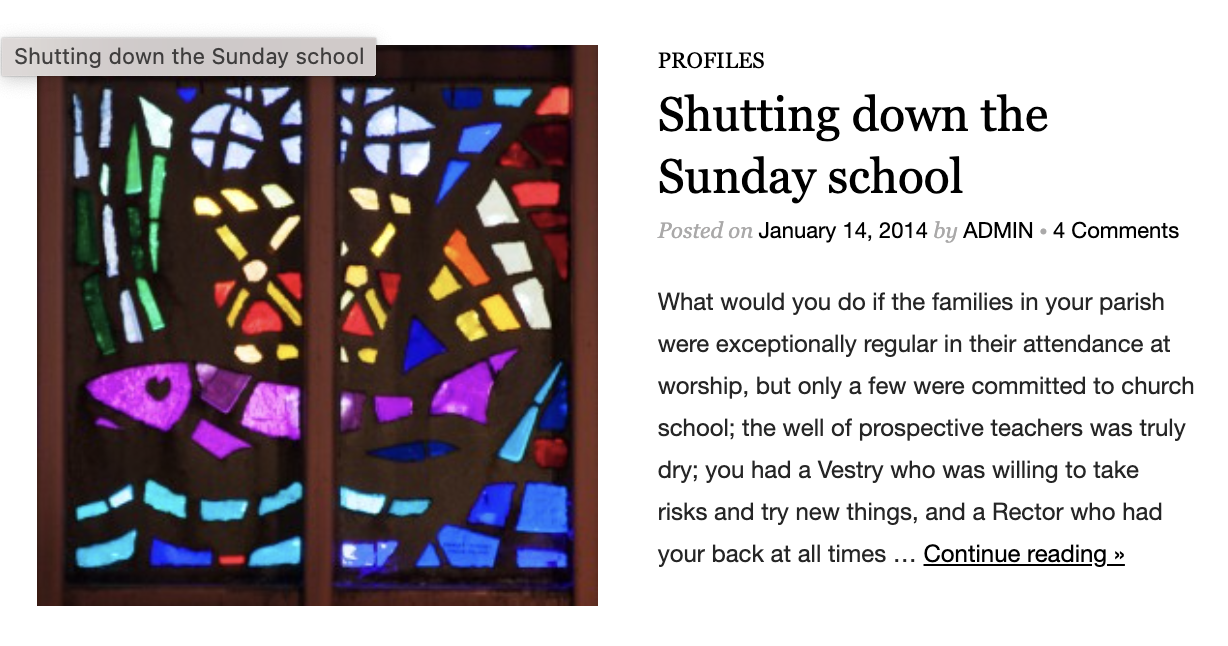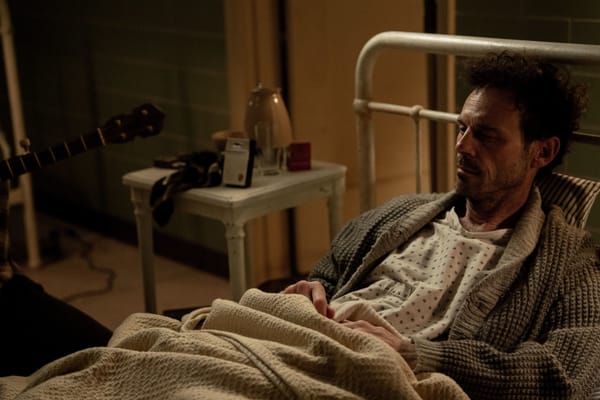Q2: How do we diversify & improve the 'post-Sunday School' ecosystem?

I have overseen exactly one online article that "went viral" in a reasonably rigorous understanding of that word. Stop me if you've heard this one.
I was exhibiting on behalf of the CMT@VTS at the 2013 Forma Conference when our table got a visit from Day Smith Pritchartt, then serving half-time at St. Andrew's Episcopal Church in Arlington, VA, and half-time as executive director of the not-quite-yet-renamed Episcopal Evangelism Society.
Day said something like, "I read your thing about John Roberto and networks. I want to make a change. Let's talk about how it might work."
Day told me that her parish had a lot of young families who were very committed to weekly Sunday morning worship. But it was much harder for them to commit to the traditional weekly Christian formation hour for the sorts of reasons you might expect:
- especially busy lives making weekend family time especially precious,
- Sunday morning sports or weekend travel sports,
- the bananas weekend traffic inside the DC Beltway, etc.
Day wanted to wind down the Sunday school machine (for the sake of these families as well as her volunteers) and "flip" the Sunday school classroom. Over the course of a half-hour conversation, we sketched the contours of a model that we would come to call "hybrid faith formation."
At St. Andrew's, that meant cancelling weekly Sunday school, providing families with high-quality faith-at-home content and activities, and convening truly excellent monthly parish-wide learning + fellowship + fun events once monthly.
It meant slightly different things for other leaders in the cohorts Lisa Kimball and I convened (joined later by Day, Matthew Koslowski, Sarah Stonesifer, and Keith Anderson) to experiment with this model.
We published "Shutting Down the Sunday School" on January 14, 2014. You can still read Day's story here via the Internet Archive. It got something like 4,000 page views overnight, and obviously more as the week went on. It was a lot for our little upstart blog. We got calls from newspaper reporters, if that gives you a sense of it.
Anyway, the ravages of time, demographic shifts, and shrinking budgets have caused many, many churches that were on the Sunday school treadmill in 2014 to adapt their practices sometime in the decade that followed. This was never every church, of course. It wasn't the case in the first church I remember belonging to, at which I was one of just four kids.
But for those experiencing it, it was a shift away from exactly the kind of programming I later witnessed and participated in as an older kid in a medium-sized, mostly white, mostly affluent suburban Episcopal church:
- 30+ weeks of adult forums per year for the adults (a general forum and a "family life class" for parents, in our church), plus ...
- 30+ weeks of Sunday school per year for the kiddos ...
- led by teaching teams of 2–4 adults who taught every single week, often for multiple years ...
- in classrooms that brought together no more than three or four grade levels (sometimes just two!) for curriculum that I assume required some special training, plus ...
- often some kind of age-appropriate "children's chapel" for the youngest kids, taking place during some or all of the main worship service, plus ...
- often some kind of months- or years-long confirmation prep experience for middle and/or high schoolers.
There are still churches doing this sort of programming, I know. I'm sure in some of them it is highly effective and is changing the lives of adults and children in some of the ways that it probably changed the lives of many of you who are reading this—and me. "If it ain't broke ..." etc. etc.
But I think the reality is that this sort of elaborate, highly differentiated, professionally supported, volunteer-intensive weekly programming is much more the exception than the rule at this point. In the—let's call it for the sake of argument and efficiency the "post-Sunday school ecosystem"—many smaller churches have seen changes marked by some or all of the following:
- significant impact from experiential, often Montessori-style programming (e.g., Godly Play) for young people—possibly tempered by the challenges of recruiting and training volunteer leaders for these specialized approaches;
- a shift from the "year-round" 30+ weeks approach to more seasonally-driven sprints (e.g., Advent and Lent), sometimes for kids and very often for adults; and
- a shift from more age-segregated experiences to more age-unified experiences, including the "one room school house" approach, intergenerational programming, etc.;
- a push for young people to be warmly accepted and age-appropriately included in the main worship service;
- more online and hybrid groups—often small, often weeknights. (One of you reached out to me yesterday and said this is working well with motivated parents who want to do some intense study together after kiddo bedtime.)
I know this "post-Sunday school" portrait is incomplete, and today's experiences are even less monolithic than in Sunday school's late twentieth century "heyday." I think that's a good thing. Discernment and intentional design—if churches can hold the space for them—are likely to yield more contextually appropriate approaches to Christian formation than when guidelines from curriculum publishers did this work for them.
For those of you making these kinds of changes, I'm curious to hear about the joys and challenges of what is emerging in its place. What's working? What isn't? What do you miss? What don't you miss? What lessons do we need to be sharing with each other?
Tomorrow: A much shorter post about collaboration.



